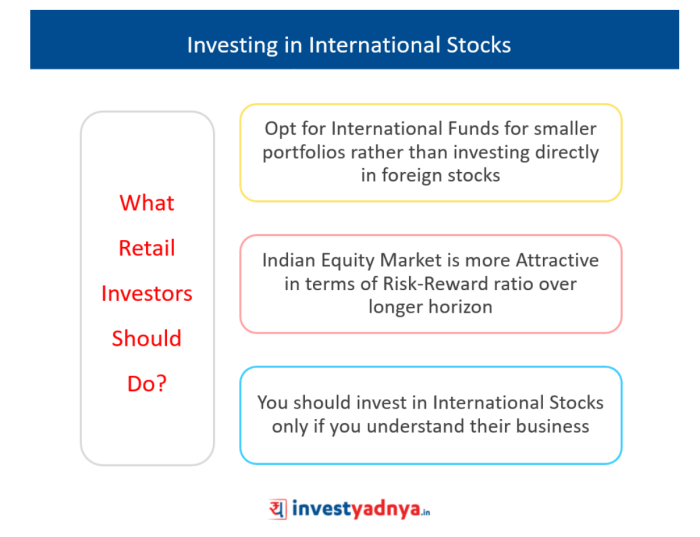Embarking on the journey of Investing in international stocks opens up a realm of opportunities beyond borders. Understanding the nuances of international markets is crucial for investors looking to diversify their portfolios and maximize returns.
As we delve deeper into this complex yet rewarding field, we unravel the key factors, strategies, and risks associated with investing in international stocks.
Introduction to International Stocks
International stocks refer to investments in companies based outside of the investor’s home country. These stocks are traded on foreign stock exchanges and can provide opportunities for portfolio diversification and potential growth.
Popular International Stock Markets
- The London Stock Exchange (LSE): One of the oldest stock exchanges globally, the LSE offers a diverse range of companies across various sectors.
- Tokyo Stock Exchange (TSE): The largest stock exchange in Japan, the TSE is home to many well-known Japanese companies.
- Shanghai Stock Exchange (SSE): As one of the largest stock exchanges in the world, the SSE provides access to Chinese companies and emerging markets.
Benefits of Diversifying with International Stocks
Diversifying a portfolio with international stocks can reduce risk by spreading investments across different economies and industries. It also allows investors to capitalize on growth opportunities in foreign markets that may not be available domestically.
Factors to Consider When Investing in International Stocks

Investing in international stocks can offer diversification and potential for higher returns, but it also comes with its own set of risks and considerations. It is essential for investors to carefully evaluate certain factors before venturing into the international stock market.
Understanding Currency Risks
Currency risk plays a crucial role in international investing as fluctuations in exchange rates can significantly impact the returns on investments. When investing in international stocks, investors should consider the potential impact of currency movements on the value of their investments. It is important to understand how changes in exchange rates can either enhance or erode returns from international investments.
- Investors can hedge against currency risk by using financial instruments such as futures contracts or options to mitigate the impact of exchange rate fluctuations.
- Diversifying across different currencies can also help reduce currency risk exposure and minimize the impact of any adverse movements in a particular currency.
- Regular monitoring of currency trends and economic indicators in different countries can provide valuable insights for managing currency risks effectively.
Impact of Geopolitical Events
Geopolitical events, such as political instability, trade disputes, or conflicts, can have a significant impact on international stock markets. These events can create uncertainty and volatility, leading to fluctuations in stock prices and investor sentiment.
- Investors should stay informed about geopolitical developments in countries where they have investments to anticipate potential risks and opportunities.
- Diversification across regions and industries can help mitigate the impact of geopolitical events on investment portfolios.
- Developing a long-term investment strategy and maintaining a diversified portfolio can help investors navigate through periods of geopolitical instability and market uncertainty.
Strategies for Investing in International Stocks
Investing in international stocks can provide diversification and potential growth opportunities for investors. There are several strategies that investors can use to access international stocks, each with its own advantages and considerations.
Direct Stock Purchases vs. International Stock Mutual Funds or ETFs
When considering investing in international stocks, investors have the option to directly purchase individual stocks or invest in international stock mutual funds or exchange-traded funds (ETFs).
- Direct Stock Purchases:
- Pros:
- Allows for more control over specific stock selection.
- Potential for higher returns if individual stocks perform well.
- Cons:
- Requires more research and monitoring of individual stocks.
- Higher risk due to lack of diversification.
- International Stock Mutual Funds or ETFs:
- Pros:
- Instant diversification across a range of international stocks.
- Professional management and research provided by fund managers.
- Cons:
- Management fees and expenses associated with mutual funds and ETFs.
- Limited control over individual stock selection.
Investing in Emerging Markets vs. Developed Markets
Another important consideration for investors looking to invest in international stocks is whether to focus on emerging markets or developed markets.
- Emerging Markets:
- Pros:
- Potential for high growth and returns due to rapid economic development.
- Diversification benefits as emerging markets may not move in tandem with developed markets.
- Cons:
- Higher volatility and risk compared to developed markets.
- Potential for political instability and currency fluctuations.
- Developed Markets:
- Pros:
- More stable and mature economies with established regulatory frameworks.
- Lower risk compared to emerging markets.
- Cons:
- Potential for slower growth compared to emerging markets.
- Limited diversification if focusing solely on developed markets.
Risks Associated with Investing in International Stocks
Investing in international stocks can offer diversification and potential for higher returns, but it also comes with various risks that investors need to consider. These risks can stem from economic factors in different countries and political instability that can impact international stock markets.
Economic Factors Affecting International Stock Investments
- Economic Indicators: Fluctuations in economic indicators like GDP growth, inflation rates, and interest rates can impact the performance of international stocks.
- Exchange Rate Risk: Changes in exchange rates can affect the value of investments in international stocks, leading to currency-related losses.
- Market Volatility: Economic instability in a country can lead to market volatility, impacting the value of international stocks.
Political Instability Impact on International Stock Markets
- Regulatory Changes: Political instability can result in sudden regulatory changes that affect the operations and profitability of international companies.
- Geopolitical Events: Conflicts, trade wars, and other geopolitical events can create uncertainty in international markets, leading to fluctuations in stock prices.
- Government Policies: Changes in government policies, such as tax reforms or trade agreements, can have a significant impact on international stock investments.
